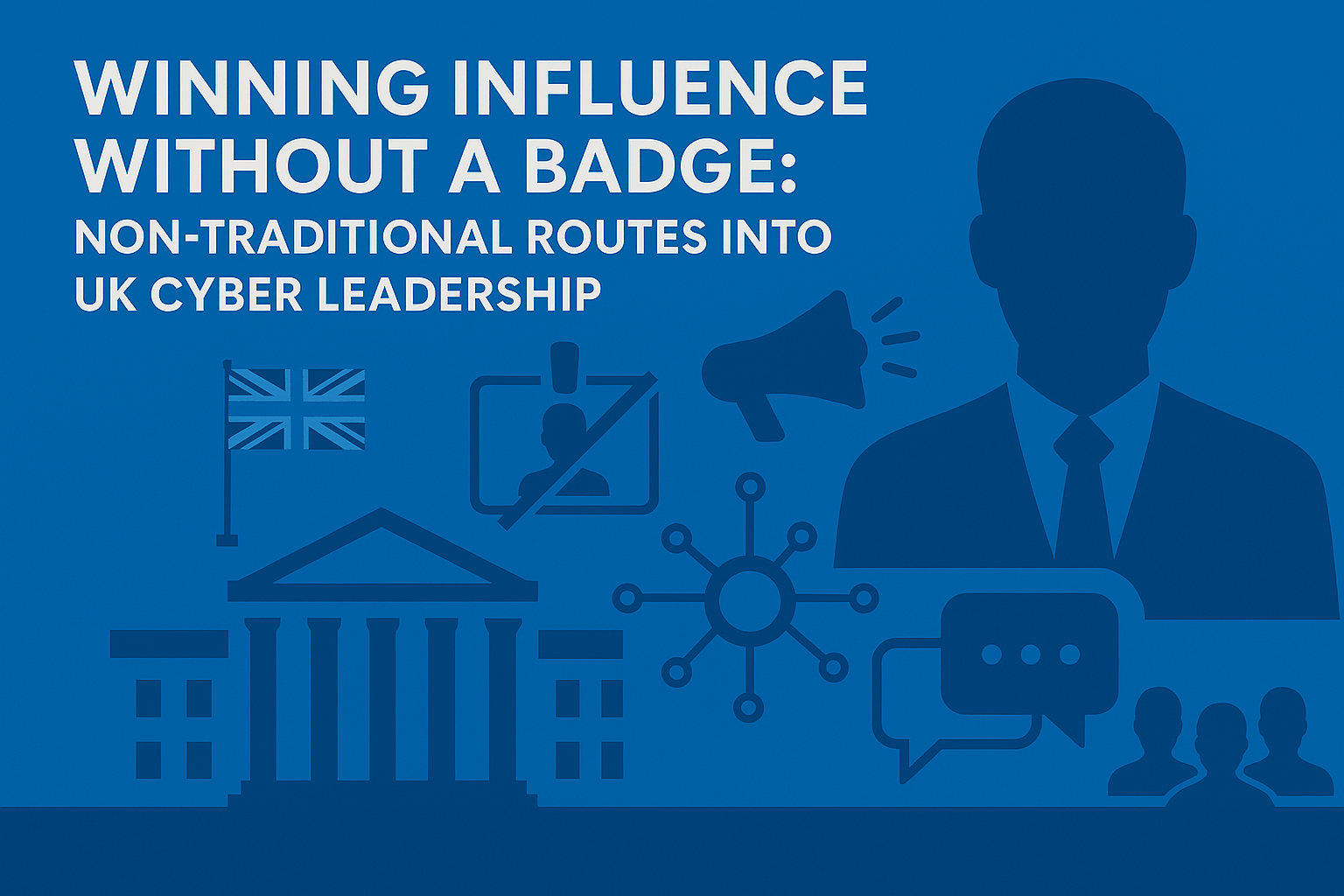You don’t need a government role or a corporate title to shape the future of cybersecurity in the UK. In the UK cyber ecosystem, influence isn’t just about where you work, it’s about what you contribute, who you connect, and how you show up. While traditional routes like senior roles in government, Big Four consultancies, or defence primes still hold sway, an increasing number of leaders, convenors, and policy-shapers are rising through non-traditional paths. This article explores how founders, freelancers, academics, and community builders are gaining real influence without formal badges, and how you can do the same.
Contents
- Contents
- 1. The Shift: From Title to Trust
- 2. Thought Leadership That Opens Doors
- 3. Community Convenors: Local = Powerful
- 4. Programme Contributors and Assessors
- 5. Micro-Founders and Specialists
- 6. How to Build Influence Without Formal Power
- 7. Examples of Non-Traditional Influence in Action
- Final Thoughts
- References
1. The Shift: From Title to Trust
In a sector defined by complexity, the old gatekeeping rules are breaking down. What matters now:
- Are you visible and credible in your niche?
- Do people cite you, ask you to speak, or bring you into conversations?
- Do you shape ideas, convene others, or deliver value that others rely on?
The UK’s cyber leadership culture is changing, becoming more meritocratic, multidisciplinary, and inclusive.
2. Thought Leadership That Opens Doors
Not all influence requires a podium. Writing, speaking, or sharing insight consistently can elevate your voice, especially if:
- You’re active on LinkedIn, Medium, or Substack
- You publish in TechUK blogs, SASIG briefings, or IET journals
- You run a podcast, post deep dives, or share live threat analysis
This builds trust, and often leads to invitations to join working groups, contribute to policy consultations, or collaborate on funding bids.
3. Community Convenors: Local = Powerful
Running or supporting a local or specialist community can build more visibility than a job title ever could. Examples:
- BSides leads, regional cyber cluster coordinators, TechWM organisers
- CyberWomen@Birmingham, Neurodivergent in Cyber, ScotlandIS Cyber Cluster
- Slack and Discord moderators, GitHub open-source contributors
These individuals are often first to spot talent, trends, and real-world gaps, and as a result, become trusted sounding boards for funders, policymakers, and buyers.
4. Programme Contributors and Assessors
By volunteering or serving as an assessor or mentor on public programmes, you gain proximity to influence:
- CyberASAP mentors and pitch panelists
- Cyber Runway or Innovate UK assessors
- NCSC for Startups technical advisors
- Local Cyber Resilience Centre (CRC) steering group members
These roles let you shape the next generation, and often lead to advisory or leadership invitations.
5. Micro-Founders and Specialists
Founders of micro-businesses (1–5 people) are often driving innovation at the edge of the ecosystem. Many gain influence by:
- Solving niche but urgent problems (e.g. OT risk, cyber psychology, AI safety)
- Being first to market with a new tool or framework
- Building trust-based relationships with early adopters, mentors, and policy teams
Even without scale, their domain expertise gets them invited into larger conversations.
6. How to Build Influence Without Formal Power
- Contribute regularly, show what you know, in your own voice
- Join public consultations or respond to calls for evidence
- Be helpful, not just visible, summarise events, connect people, amplify others
- Be present in working groups, especially where policy, funding, or community needs overlap
- Stay consistent, showing up over time builds durable credibility
7. Examples of Non-Traditional Influence in Action
- A neurodivergent founder builds a behavioural risk tool → speaks at DSIT event → joins UKCSC standards pilot
- A university lecturer mentors CyberASAP teams → joins DSIT grant review board → gains influence across commercialisation policy
- A regional CRC volunteer becomes known for training design → joins TechUK Cyber Skills Working Group → contributes to government white paper
Final Thoughts
Influence doesn’t require a badge. It requires showing up, speaking clearly, and doing the work that others trust, cite, and build on.
The UK’s cyber future will be shaped not just by job titles, but by those who take initiative, build communities, and share knowledge.
In cybersecurity, real leadership is earned, not appointed.
References
- Inside the UK Cyber Ecosystem: A Strategic Guide in 26 Parts
- The Insider’s Guide to Influencing Senior Tech and Cybersecurity Leaders in the UK
- Winning Influence Without a Badge: Non-Traditional Routes Into UK Cyber Leadership
- The Shadow Ecosystem: Alumni Networks, Closed Groups, and Whisper Influence in Cyber
- What CISOs Really Read: Reports, Forums, and Signals That Shape Decisions
